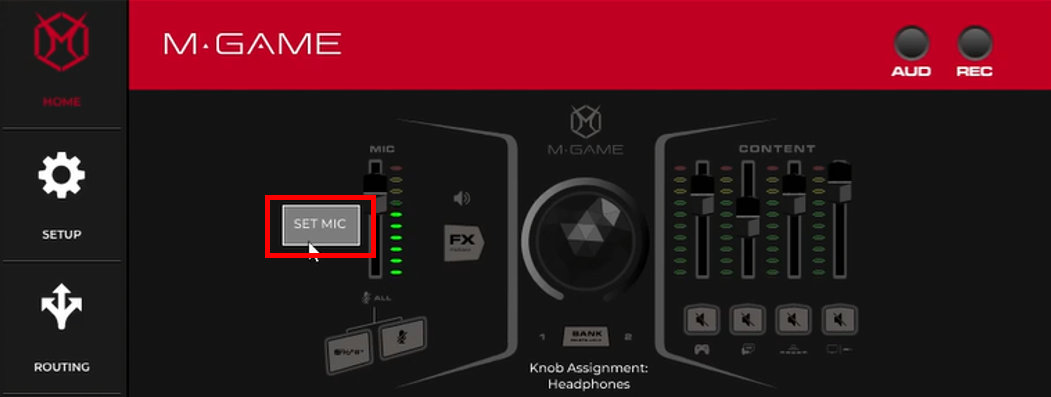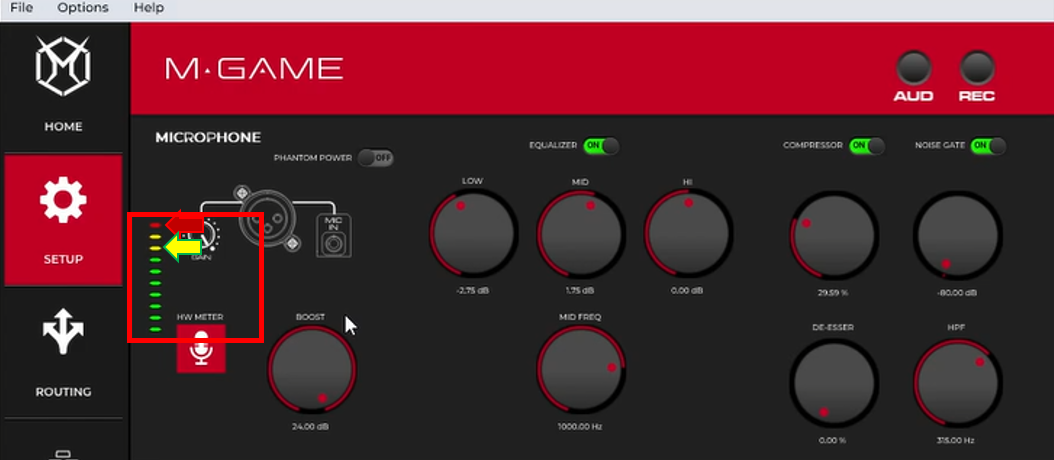
Contents
Hardware Setup
- Download and install the latest M-Game software (with embedded audio driver) from m-game.com.
- Connect the power cable to the M-Game Solo. Now connect the USB cable from the computer to the M-Game Solo. Now you can press the power button.
- Connect your separate headphones and microphone, or combined headset, to the rear panel of the M-Game Solo.
- Open the M-Game software and select either the SET MIC from the HOME tab and follow the on-screen instructions or go to the SETUP tab.

- Under Microphone, turn Phantom Power on or off depending on whether you’re using a condenser microphone (Phantom Power on) or a dynamic microphone (Phantom Power off).
Note: Headset microphones do not require phantom power.
- Speak into your mic at the loudest level you expect to speak in your stream and begin turning up the Gain knob on the rear panel of M-Game Solo. You'll notice that the Mic Fader LEDs on M-Game Solo will light up when you speak, showing the incoming signal. Continue speaking into the mic and turning up the Gain knob until you see the Mic Fader LEDs flash red 3 times. If you see the Mic Fader LEDs flash red 3 times, this means M-Game Solo's Mic Gain knob is set too high. Turn down the Mic Gain knob until you no longer see the LED flash red 3 times.
Gain knob set to high = flashing 3x Gain knob set correctly = Close to the top LED at your highest speaking voice
Gain knob set correctly = Close to the top LED at your highest speaking voice Note: If you are using a low gain mic (like a SHURE SM7B or ElectroVoice RE20) you will need to use the M-Game software's BOOST function. You can find BOOST in the Setup Tab under Basic Microphone Settings. You can change the BOOST level from Off to +24 dB.
Note: If you are using a low gain mic (like a SHURE SM7B or ElectroVoice RE20) you will need to use the M-Game software's BOOST function. You can find BOOST in the Setup Tab under Basic Microphone Settings. You can change the BOOST level from Off to +24 dB.
Boost set to high = Top red LED lit in the software
Boost set correctly = Yellow LEDs lit at your loudest speaking voice
Note: Now that you’ve setup your mic you can turn off the HW Meter button in the M-Game Software to return the Mic fader to its default LED behavior
HW Meter On
HW Meter Off
- Adjust the EQ, Compressor, Noise Gate, High Pass Filter (HPF), and De-esser settings to get the best sound from your mic.
Note: You can also use one of the Mic presets in the M-Game software to automatically configure your mic’s settings. These mic presets are found in File > Setup > Load Microphone Settings.
- Under Microphone, turn Phantom Power on or off depending on whether you’re using a condenser microphone (Phantom Power on) or a dynamic microphone (Phantom Power off).
- In the SETUP tab's HARDWARE section select what source your Game audio is coming from. Because you can have multiple set-ups, you will need to select Stream PC for your Game Audio Source.

- Open your game, chat, M-Game software, streaming software, and any other programs you will be running in your stream and ensure that their audio is playing.
- In the M-Game Solo software go to Options > Redirect Output

- In the M-Game Solo software's Output Redirection you will see every audio source running in the Application column and where that audio can be sent to (its Routing) in the Output Pair column. This enables you to send audio from different programs/applications to the M-Game.
- In the M-Game Solo’s Output Redirection's Application column you will see the game application that you are currently running. In the Output Pair column select Game Out. Once this has been selected, your game’s audio level will be controlled by the Game fader on your M-Game.
- In the game that you are running select where your microphone audio will be coming from, in this case, it will be the M-Game Solo’s ALT Output. To do this, go into your game’s settings, and where it has a selection for where your audio or mic input is coming from, select ALT (M-Audio M-Game Solo).
Important: Make sure that your routing in the M-Game software is set to only send your microphone's audio
Important: The above image is a reference image of setting the ALT input in your software. Your software will vary from the above image. - Select these additional routing options from the M-Game Solo Output Redirection:
Chat: Select CHAT OUT to route chat app’s audio to the CHAT fader.
Important: If you're using a Chat application like Discord, set the Audio Input to CHAT IN L/R and Output to M-Game Solo. This will ensure that, with your OUTPUT REDIRECTION set correctly in the M-Game software, your Chat audio is sent to the M-Game Solo's Chat fader, and only your Mic audio is sent to the Chat. This can be done in Discord by going to the bottom left cog icon (User Settings) next to your User Name and under APP SETTINGS selecting Voice and Video. In the Voice and Video window you will see Input Device and Output Device settings at the top under Voice Settings
Music: Select SYSTEM OUT to route music program audio to the System/AUX fader.
Note: You can route additional computer audio sources to the SYSTEM/AUX channel if you would like to control additional streams of software audio.
Discord Routing
Routing 
- Open your streaming/broadcast software, such as OBS used in the example below.
Setup with OBS
- In the File > Settings menu, select the Audio tab.
- Under Global Audio Devices set Desktop Audio to Disabled, set Desktop Audio 2 to Disabled.
- Set Mic/Auxiliary Audio to STREAM L/R (M-Audio M-Game Solo Stream). Make sure that Mic/Auxiliary 2, 3, and 4 are all set to Disabled.
- In Advanced, set Monitoring Device to Default. Click Apply and OK.

- Check OBS or other software you're using to record to make sure that your individual signals (Mic, Game, Chat, Sampler, and System) signals aren't clipping (going into the red) and are balanced. An easy way to check this is by pressing all of the Mute buttons on the M-Game hardware and turning up the fader levels one at a time, first checking the mic level, as that's what you want your viewers to hear loudest, then proceed with the other M-Game faders.
Note: The optimal level in OBS is in the yellow area (between -15 dB and -10 dB).
- Start your stream and have fun!
